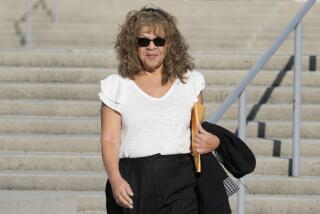Carona’s case sure resembles Stevens’
- Share via
I’ve got a popular Alaskan politician on the brain this week, and it isn’t the one with the new wardrobe who’s running for vice president.
Rather, it’s longtime U.S. Sen. Ted Stevens, a Republican who’s much more interesting to me at the moment than Gov. Sarah Palin. Stevens, a 40-year Senate veteran long known as “Uncle Ted” to his constituents, awaits a federal jury’s verdict in Washington, D.C., on charges that he made false statements on Senate financial disclosure forms to conceal more than $250,000 in gifts, most for home remodeling from an Alaskan businessman.
Ring a bell?
Remind you of a former Orange County sheriff who goes to trial next week on charges that sound remarkably similar?
Mike Carona, midway through his third term until he resigned early this year to concentrate on his legal defense, was indicted a year ago for, among other things, allegedly accepting cash and other gifts and failing to report them on disclosure statements.
His wife and a lawyer described as his former mistress also face charges. Prosecutors say the three received financial considerations worth more than $350,000.
As I’m typing, the Stevens jury has ended its second day of deliberations without reaching a verdict.
The Stevens trial intrigues me for a couple reasons beyond its similarities to Carona’s case and the fact that both were once riding high.
If Alaska had its Uncle Ted, Orange County had “America’s Sheriff,” as TV talk show host Larry King dubbed Carona after he appeared on CNN after a child-abduction case.
For starters, what if Stevens is acquitted?
Obviously, it doesn’t speak to the charges against Carona, but it would deflate the notion that the government is largely invincible in cases such as this.
The conventional wisdom is that the government doesn’t pursue a corruption case against a high-profile public official unless it thinks it has it nailed.
A Stevens victory would undermine that. And for what it’s worth, the bulk of the charges against Carona, as with Stevens, involve disclosure statements -- charges that might seem less compelling to a jury than juicier bribery or extortion cases.
But Carona also will have to rebut charges of witness tampering that are based on secretly recorded conversations between him and his chief accuser, former Assistant Sheriff Don Haidl.
The other element of intrigue is whether Carona will testify. I’ve written before that winning over an audience was one of his strengths as a politician. Will his attorneys let him try it under oath?
Stevens testified in his defense.
The typical reaction of jurors, I’d argue, is that innocent defendants should be willing to take the stand. They’re not supposed to think that way, but they do.
So, if Stevens is acquitted after taking the stand, does that give Carona’s lawyers additional incentive to turn him loose?
Unless they do a bang-up job explaining the contents of the secret recordings with Haidl on the stand, who else but Carona can neutralize the tapes’ possible damaging effect?
However Carona’s trial ends, it will be hard-pressed to match Stevens’ for entertainment value. His character witnesses included two Alaskan champion “dog mushers,” a U.S. senator and former U.S. Secretary of State Colin Powell.
Similarly, Stevens’ prosecutors allege that, besides the extensive home renovations, he also received a gas stove, a sled dog and a statue of migrating salmon.
Carona’s alleged gift list didn’t get much more exciting than sports tickets, pens and a boat.
Chances are that we’ll have a verdict on Stevens before Carona is scheduled to appear Tuesday for jury selection.
But since the cases tend to echo each other, I’d strongly advise Carona not to parrot what Stevens said under oath when asked by prosecutors about a massage chair he’d had for seven years.
Expensive enough to require listing on a disclosure form because it was given to him by a friend, it had not been.
“He bought that chair as a gift, but I refused it as a gift,” Stevens testified. “He put it there and said it was my chair. I told him I would not accept it as a gift. We have lots of things in our house that don’t belong to us.”
--
More to Read
Sign up for Essential California
The most important California stories and recommendations in your inbox every morning.
You may occasionally receive promotional content from the Los Angeles Times.










